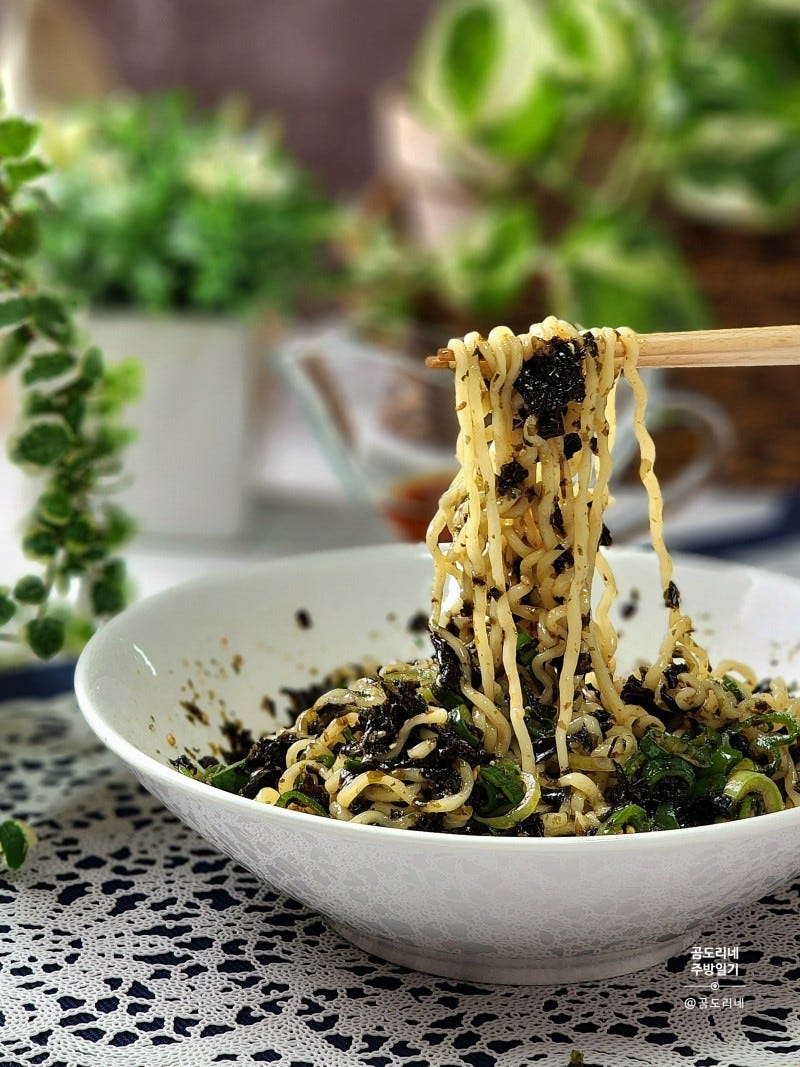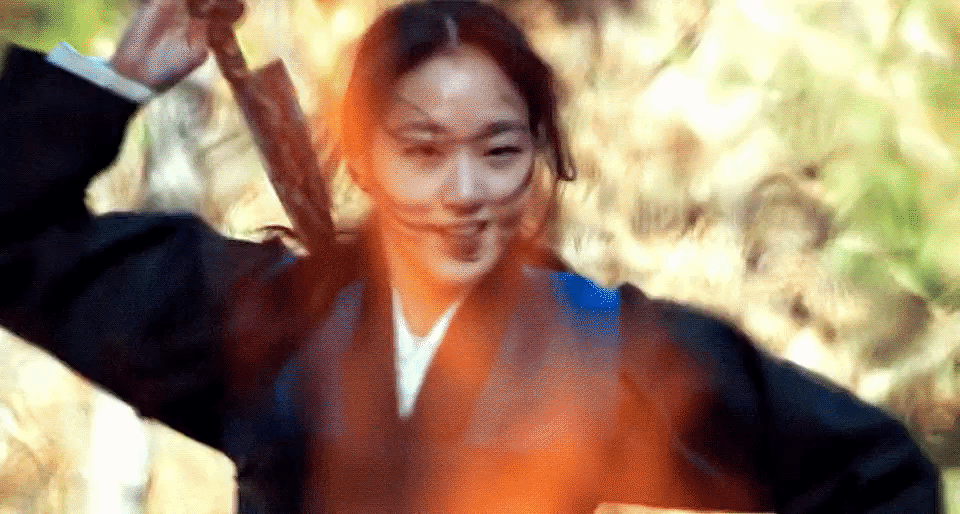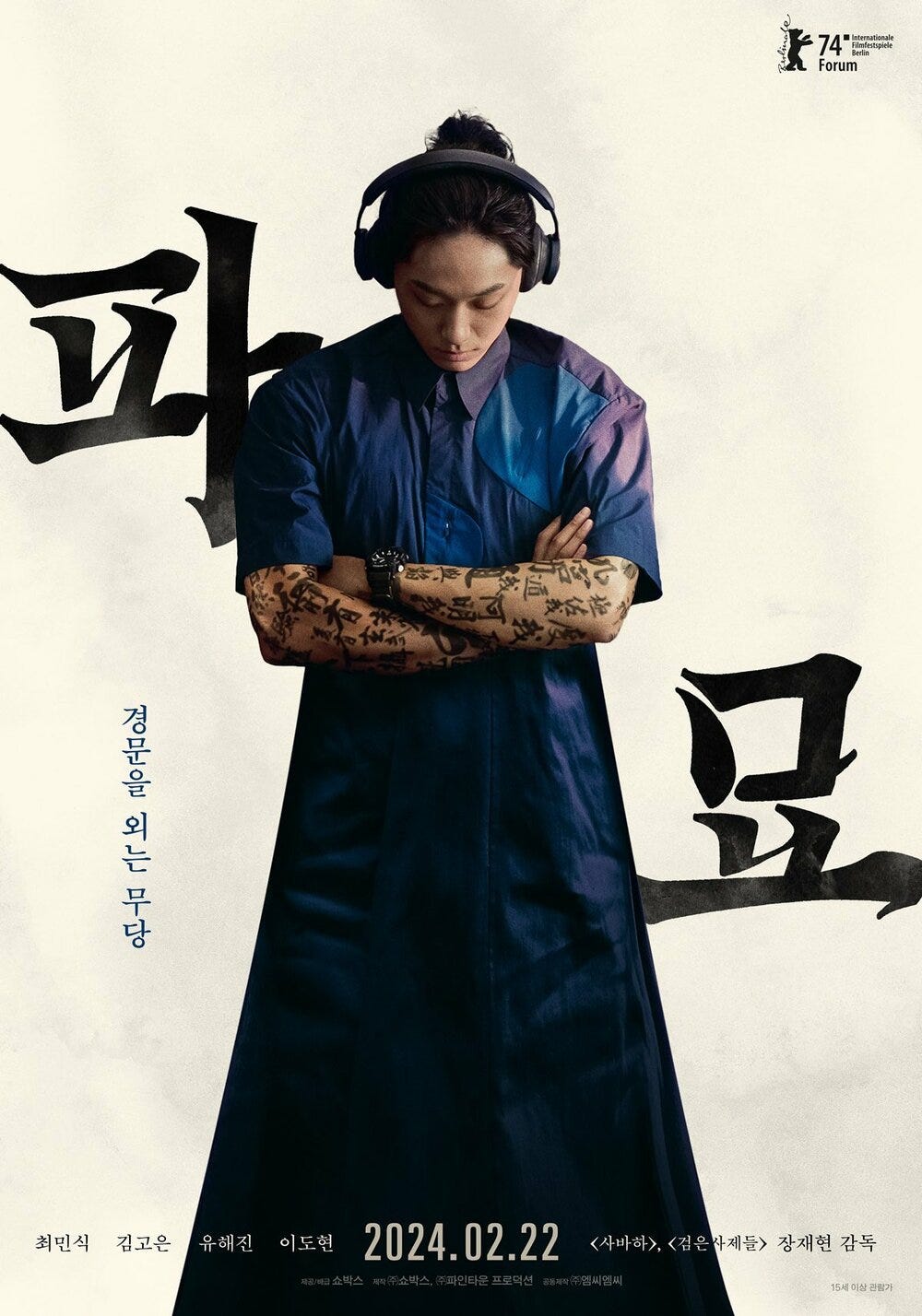안녕, it’s Ari, your talkative Korean friend and weekend reminder. 🎉 I’m excited to tell you that I brought back my podcast, Annyeong Ari, the narrated and more talkative version of this newsletter. 🎉🎊🥳 If you want to enjoy my newsletter on the move, want to repeat Korean words after me, or want to hear how bad my English speaking is, check out my podcast on Spotify, Apple Podcasts, or others.
Today’s newsletter is about a delicious dry noodle, Korean exorcism, and a vocabulary lesson. Let’s start!
Gim Ramen

If you're tired of the usual instant noodle soup, elevate your noodle game with gim ramen, a delightful dry noodle alternative. You can transform any instant noodle into gim ramen with a simple sauce made from water, soy sauce, sugar, and the provided ramen packets. Boil the noodles, toss them with the sauce, and enhance the dish with gim (dried seaweed), perilla oil, and chopped scallions. This easy recipe not only tones down the spice of the ramen but also introduces healthy and savory elements. Check out the detailed cooking video, give it a try, and savor a perfect quick lunch for the weekend. Bon appétit! 😋
If you like spicy noodles, you can add chopped green chili peppers or use Buldak Bokkeum Myun. 🥵
Can Exorcism Be a Party? (Yes, It Can in Korea)
The South Korean mystery thriller movie 'Exhuma' 👆 is sweeping the nation by storm, consistently dominating the Korean box office since its release. It has outperformed films like Dune: Part 2 and Wonka, amassing an impressive 5 million viewers in just 10 days. The movie is poised to achieve the coveted 10 million-viewer milestone, a feat accomplished by only a few mega-hit films in a year.
Let me share its synopsis: After generations of suffering from a peculiar disease, a wealthy Korean family living in LA summons a young shaman duo, Hwa-rim (Kim Go-eun), and Bong-gil (Lee Do-hyun), to save the newborn of the family. Sensing a connection to their ancestor’s grave, Hwa-rim suggests an exhumation, involving the renowned feng shui master Sang-deok (Choi Min-sik) and the undertaker Yeong-geun (Yoo Hae-jin). The mysterious grave is situated in an eerie location absolutely unsuitable for human burial. Although Sang-deok initially refuses due to sensing ominous energy, persuaded by Hwa-rim, they eventually embark on the journey to move the grave. And then, something that should have remained buried arises.
The movie covers the dark history of the country and traditional cultures like shamanism, feng shui, and exorcism in an entertaining and mysterious way. In the film, you can see how a Korean-style exorcism works, which is very different from Western exorcism.

In Korea, there is a profession called ‘mudang,’ which is a shaman and exorcist at the same time, played by Kim Go-eun 👆and Lee Do-hyun in the movie. Their job is to call and talk to spirits and console them to help them rest in peace. While traditional Korean musical instruments are played at a high volume, a mudang, wearing hanboks, dance and sing to summon spirits. In the ritual site, foods are provided to serve and allure spirits. Because there’s music, dance, and food, in the past, it was kind of considered as a party where people in a village gather and enjoy.
What distinguishes Korean exorcism from Western exorcism is that Korean exorcism is all about consoling spirits rather than dispelling them. An expert said Korean exorcism and shamanism don’t have a concept of curse or evil spirits; there are only spirits who need consoling and feeding. Maybe this could be why “밥 먹었어요? (Did you eat?)” became to mean “How are you?” in Korean. 🤔 It can also explain why Koreans prepare food when they visit their loved one’s grave.
Mini Korean Lesson: 🪦
The Korean title of ‘Exhuma’ is “파묘 (pa-myo),” which means “destroying a grave.” It refers to the process of changing a burial site, including removing the original grave and collecting bones.
The second letter of this word, “묘 (myo),” means “grave,” and it is used in many grave-related words, as follows:
종묘 (jong-myo):
Jongmyo is a shrine in Seoul housing the spirit tablets of the former kings and queens of the Joseon Dynasty (1392-1910). It is the oldest and most authentic of the Confucian royal shrines to have been preserved, according to UNESCO. You should pay a visit to this place if you come to my country.
묘비 (myo-bi):
It means “gravestone.” In the past, gravestones were only for royals and filled with a lengthy biography of the deceased person, but nowadays, they are for everyone and mostly filled with the name, birthdate, and date of death.
공동묘지 (gong-dong-myo-ji):
It means “cemetery.” Cemeteries in Korea are located in suburban or rural areas. They are mostly on the mountains, so hiking is necessary when visiting one’s grave.
Thanks for reading! If you liked my newsletter, ☕️ buy me a coffee ☕️ to support my work. It’ll help me keep writing! I will be back next week. 안녕!





Hello Ari , still getting used to this mediium of communication at my age.
Have read quite a few of your articles by now which are always thought provoking, and also listened to some of your previous podcasts ,and also listened to this evenings release.
So I have listened to quite a few samples of your spoken English and read your written, and feel qualified to give you an assessment as an aging Australian Engilish speaker and reader with an academic background.
You will definitely have to stop apologising in your emails and podcasts about Bad English..
Your speaking is very lucid and clear, and your prosody is good, which makes it very easy to follow, even with a few very minor mistakes.
So Be very Cool re Your English; it is 100% and more better than my non existent Korean, and my slowly improving French.Sure others of your readers or listeners will say the same.
English is a troublesome language, but can put you onto some interesting sites, if you wish.
Intrigued by your report on the movie Exhuma (the full English word Is Exhumation, and could talk a bit more), as it was on a list of questions I had about Shammanism and The Dead, and is it really a big thing in modern Korea and not on just KDramas (which due to period of illnees , I have got to watch a lot off, but obviously subbed versions)??
And the recipes are great, and will have to talk more about them.
And like your Korean Language education.
Regards, Cristoffa.
I was on the fence about watching 파묘 but you've convinced me to watch it this weekend!